I’ve lived in Hawaii most of my life, but there are lots of things I’ve never seen and done, so the husband and I have been making an effort to fill in some of the experiential holes. We’re just back from the Big Island, and volcanoes, of course, were one of the highlights of the trip.
For those not familiar with Hawaii, all the islands are volcanoes, but only on the “Big Island,” (more properly known as “Hawaii”) are there active volcanoes. Hawaii island really is much bigger than all the other islands. It’s made up of five volcanoes: the very old Kohala Mountains, dormant Hualalai, dormant Mauna Kea (site of the world-famous astronomical observatories), intermittently active Mauna Loa, and continuously active Kilauea.
On this trip we visited Kilauea Caldera, the very top of the ~4,000′ mountain, which is in a rainforest, and part of Hawaii Volcanoes National Park. For decades the primary site of eruption has been a vent called Pu`u O`o, much farther down the mountain, but the caldera area has been more active lately. Here’s what we saw, one evening in the park:
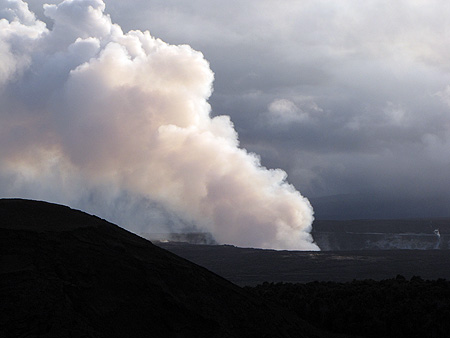
Steam/fume cloud rising from Halemaumau, Kilauea Caldera, August 30, 2011
This level of steam/fumes is new in my experience. Lava can’t be seen, but after sunset the red glow of lava can be seen in the steam cloud.
Half-an-hour drive away, this was the view from our hotel room in Hilo, looking toward 14,000′ Mauna Kea. (Kilauea would be off to the left, far outside the photo.)
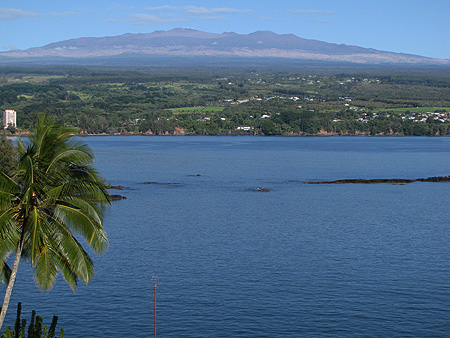
Near the 13,000′ level on Mauna Kea is a tiny, but permanent water feature known as Lake Waiau. It’s by far the highest elevation lake in Hawaii, which has very few lakes at all:
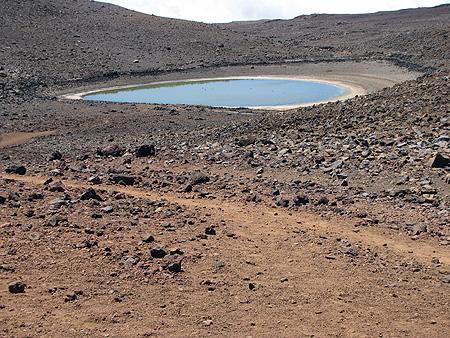
Lake Waiau, Mauna Kea, August 31, 2011
We went to see the lake, since it’s such an odd geological feature. We’ve been told the water used to be crystal clear, but sadly, it no longer is. We can only guess that someone threw nutrients into the water.
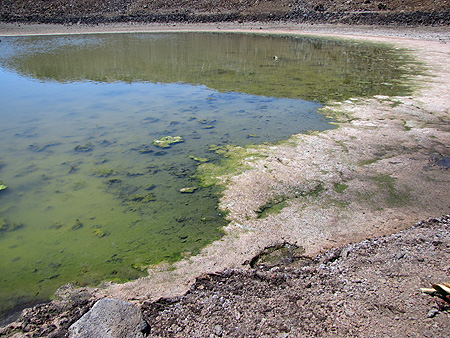
Algal growth in Lake Waiau
At any rate, while having lunch, the cloudbank on the Hilo side pulled back and we were left looking at this . . .
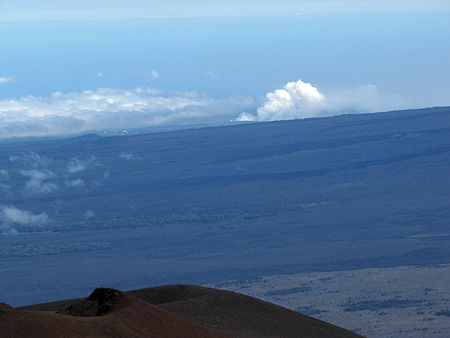
Pu`u O`o from 13,000' level of Mauna Kea
. . . and after a minute we realized that plume was not a wildfire or a cloud–it was a volcanic vent. It took a few more minutes to realize that a higher elevation “cloud” rising over the ridgeline . . .
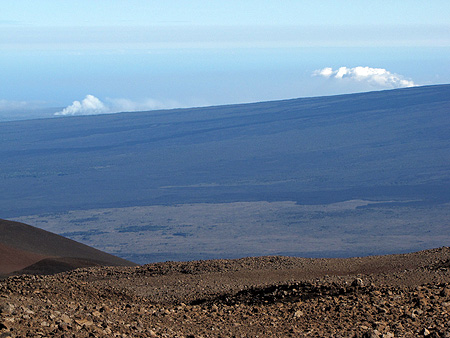
Halema`uma`u and Pu`u O`o seen from 13,000' level of Mauna Kea
. . . was actually the plume from Halema`uma`u Crater in Kilauea Caldera, where we had just been the evening before. So we were looking at both eruptive sites of Kilauea Volcano. I have to admit I found this a little bit unnerving, because from where we were sitting Kilauea Volcano looked so very active. It’s easy to imagine earthquakes shaking the whole island–which does happen. But the sight was awe-inspiring too.
We all learn to live with the dangers inherent in our lives, but I have to give special acknowledgment to people on the Big Island who live every day of their lives with this very active volcano just a few miles away. Then again, after spending a few days in and around beautiful Hilo, I can easily understand why people fall in love with the windward side of the Big Island.













